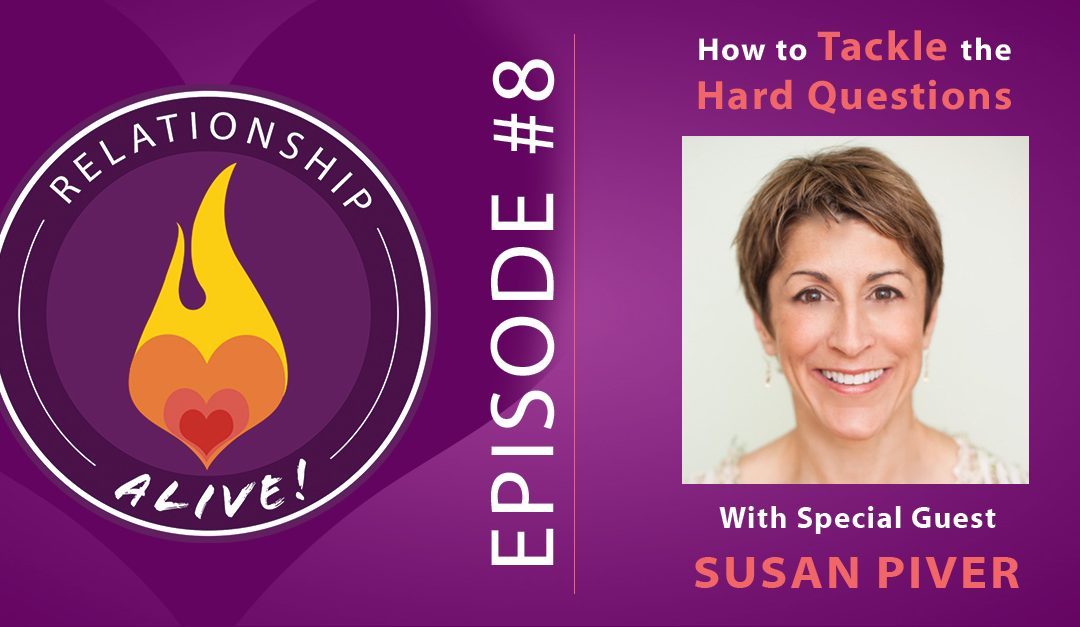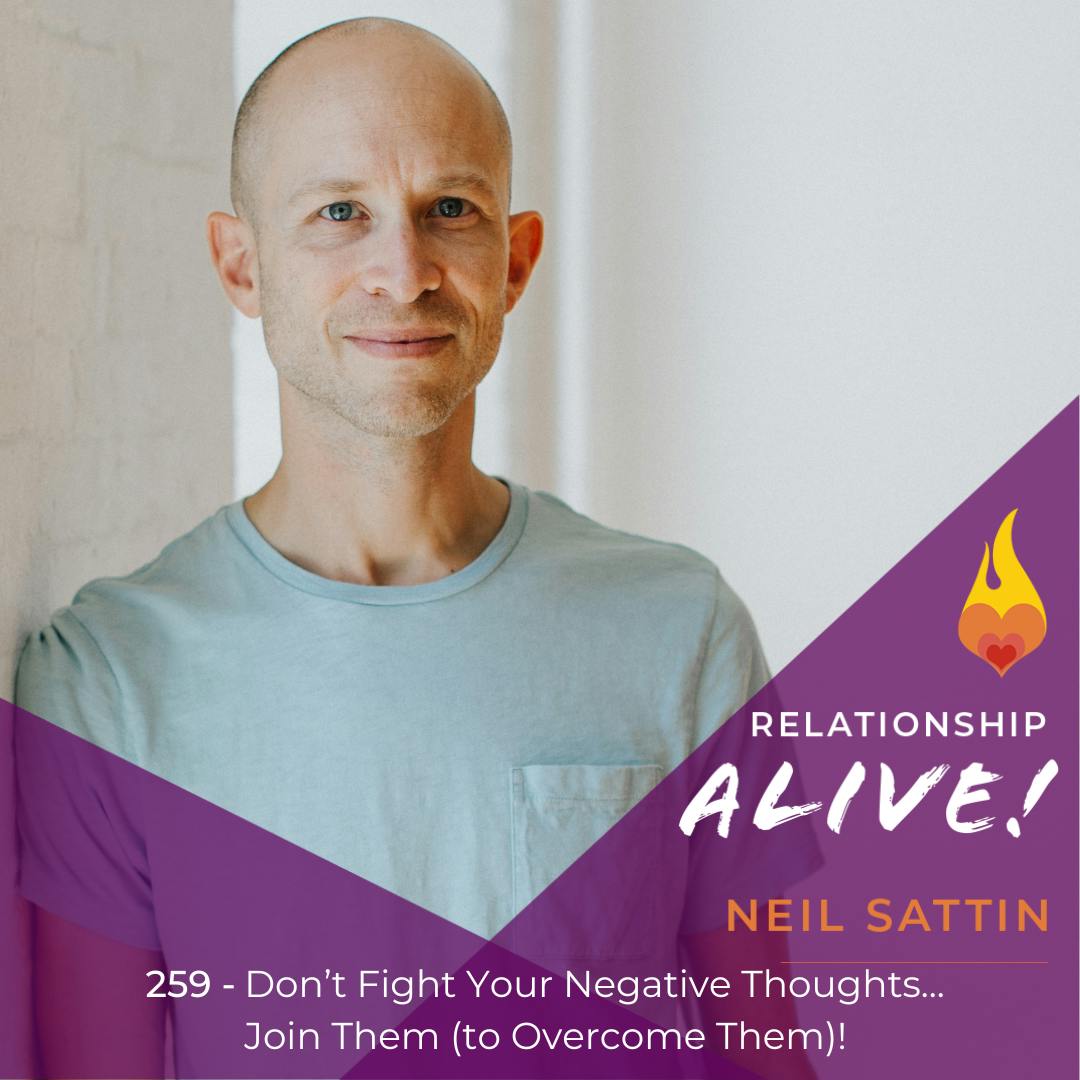For this episode, we’re going to focus on something extremely simple and practical - the importance of questions. How well do you know your partner? If you say you know them well, are you sure that you’re not actually making assumptions about them? And how do you cultivate your curiosity in a way that keeps your relationship fresh, instead of stuck in the same old patterns?
My guest today is Susan Piver, NY Times bestselling author of The Hard Questions: 100 Essential Questions to Ask Before You Say I Do. This book came out of the personal experience of talking to her boyfriend (now her husband) about getting married. She contemplated the commitment: How do I make the commitment? How can I honor the commitment? She proceeded to the bookstore to find help but found NOTHING on the subject. The idea for her book was born.
Susan realized that most failed relationships didn’t fail for lack of love, but for lack of ability to build a life together that both partners loved. The questions that she poses in her book are based around helping a couple get to know each other (and themselves) in various areas of life. The questions themselves are not complicated - they’re quite simple, in fact! What makes them the “Hard” questions is that answering them will require you to get really clear about who you are, and who your partner is.
Susan discusses the following topics from her book:
- The 100 Essential Questions are pragmatic and limited to the important things that some people argue about in real life—the places of potential disconnect. She finds that it’s best to not worry so much about hypothetical questions like “what would you do if you were on Mars and only had a plunger and a rowboat?” - but to focus more on simple questions like “If one of us doesn’t want to work, under what circumstances, if any, would that be okay?” - deceptively simple, right?
- Susan’s questions are basic and without philosophy. More examples include: Do we eat meals together? If so, which ones? What if one of us is attracted to someone else, either superficially or deeply? The purpose of these questions is to help you reflect on your experience and your partner’s experience. They can prevent entering into a committed relationship based on those assumptions that we are tempted to make. Don’t make assumptions! Tackle the hard questions!
- As you address the questions, you do not have to have the same answers as your partner. You may disagree about some answers or not know how to answer in some cases. Your goal is to answer as honestly as possible. Or, if your partner is answering, can you listen as openly as possible? Can you put aside your own judgments? If your partner’s answer is leading you to experience certain emotions, can you notice them and set them aside, for the moment?
- Focus on really trying to GET your partner. First of all, do you even understand what they’re saying? Reflect back to them the answer that you’re hearing to see if they confirm that you are hearing them accurately. You could then see if you can come to understand WHY they are answering in that particular way.
- Some questions are considered “deal-breakers” and could cause the relationship to end. Do you want to have children? What religion, if any, do you practice? Where would you like to live? Identify for yourself which questions represent deal-breakers, and which ones simply represent a place where you may have a conversation that evolves over time.
- Be careful of issuing ultimatums because there is nowhere left for that conversation to go. Remember, even “unsolvable” problems can be worked out over time with understanding and development. Susan shares great personal examples from her own experience and how she and her husband handled those issues.
- There is a contrast to “being in love” and “acting lovingly.” From Susan’s perspective, you can’t commit to loving someone always because love is an emotion that is changeable. You CAN commit fully, completely, and honestly to acting lovingly toward that person. That means being open, caring, and willing to share with that person. You can accomplish those acts of love even when you don’t feel “in love.” Acting “as if” will actually help you nurture feelings of loving and cherishing your partner even in those moments when you don’t feel “in love.”
- Susan speaks of the contrast between Projecting and Hearing, especially regarding answering the hard questions. When projecting occurs, the result will probably be a fight. The less you critique and try to change your partner, the better off you will be, and you will hear them better. Be honest about your fears and uncertainties. Own your discomfort about certain issues.
- A good practice when your partner’s answer triggers you is to get clarity by saying something like “I’m telling myself a story that you are saying such-and-such, and I’m making that mean such-and-such. Is that true?” What’s great about that language is that it helps you see that you are ALWAYS telling yourself a story about how you’re experiencing the world - stating it explicitly helps you take responsibility for your story. And asking this question allows your partner to help you discover what’s true about your story, and what isn’t.
- Susan is a Buddhist and meditation teacher. She teaches mindfulness and awareness as part of the meditation process. She finds those qualities essential in her relationship, allowing her to own what she feels and separate her projections from who her husband actually is. You can take part in her Open Heart project in which she teaches meditation online. Those who sign up receive a free weekly video meditation. A benefit of these meditations is that they will give you the ability to weather discomfort without trying to run from it.
- The questions in Susan’s book cover many areas, including home, money, work, sex, health, food, and family. She wishes she had included questions about stepfamilies, alcohol/drug use, and other addictive behaviors. What questions would you add to the list? Please let us know if there are other essential questions (we can discuss them in the Relationship Alive Community on Facebook)
Links and Resources:
http://www.susanpiver.com (Susan’s website, including information on teaching, live events, and workshops.)
http://www.susanpiver.com/newsletter-signup (Sign up here for Susan’s newsletter, blog posts, and weekly video meditations.)
https://www.neilsattin.com/susan is the direct link to this episode. Visit to download the show guide, or text “PASSION” to 33444 and follow the instructions to download the show guide. If you download the guide within the first week of this episode's airing, you are automatically qualified for a chance to win a signed copy of “The Hard Questions”!
Our Relationship Alive Community on Facebook
Amazing intro/outro music graciously provided courtesy of:
The Railsplitters - Check them Out!


